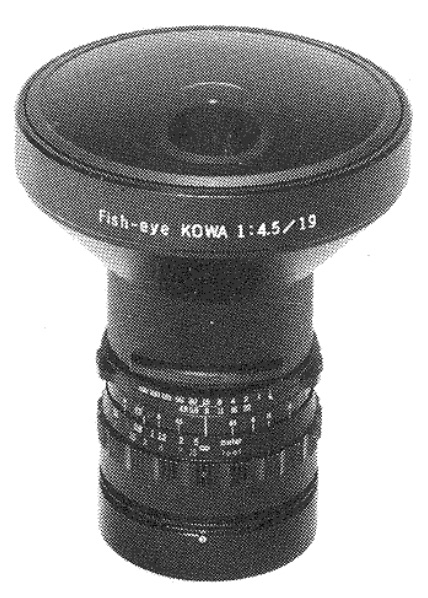Kowa 19mm F/4.5 Fisheye
Fisheye lens • Film era • Discontinued
- Announced:
- · 1970
- Production status:
- ● Discontinued
- Country of design:
- · Japan
- Original name:
- · Kowa Co., Ltd. Fish-eye KOWA 1:4.5/19
- Class:
- · Slow 6x6 medium-format circular fisheye lens
- · Professional model (Top class)
- System:
- · Kowa Six (1968)
Abbreviations
| FISHEYE | An ultra-wide angle lens with strong uncorrected barrel distortion and extreme angle of view. |
Specification
| Optical design: | |
| Medium format 6x6 | |
| 19mm | |
| F/4.5 | |
| 14 elements in 9 groups | |
| Circular fisheye | |
| Kowa Six [79mm] | |
| 180° | |
| Diaphragm mechanism: | |
Diaphragm type: | Automatic |
Aperture control: | Aperture ring (Manual settings only) |
| Built-in leaf shutter: | |
Type: | Mechanical Seiko SLV #0 |
Range of shutter speeds: | 1 - 1/500 + T |
Self-timer (V): | Yes |
Shutter speed control: | Shutter speed ring |
Flash sync mode: | M & X sync |
Flash sync terminal: | Yes |
| Focusing: | |
| 0.40m | |
| <No data> | |
Focusing modes: | Manual focus only |
Manual focus control: | Focusing ring |
| Physical characteristics: | |
| 2290g | |
| ⌀136×168mm | |
| Accessories: | |
| Removable front filters are not accepted | |
Additional features: | Rear gelatin filter holder |
| Not available | |
| Not compatible |
Sources of data
- Kowa Super 66 system. Technical data bulletin.
- 6x6 single-lens reflex camera Kowa/SIX booklet.
- 6x6 single-lens reflex camera Kowa/SIX MM booklet.
- 6x6 (2-1/4-square) single-lens reflex camera Kowa/SIX MM booklet.
- 6x6 (2-1/4-square) single-lens reflex camera Kowa/SIX booklet (38 pages + request for revision).
- Kowa Super 66 system. Professional medium format SLR booklet.
- Kowa Super 66 system. Owner's manual.
- Kowa Super 66 booklet (June 1976).
Manufacturer description
By far the widest focal-length lens ever offered to 2 1/4 photographers, this unique optical instrument projects a circular image onto the film plane, encompassing a full 180 degrees. Originally developed for industrial and photogrammetric applications, Fisheye lenses are preferred for creative special-effects work, as well as for showing different perspective. The close minimum focusing distance of 14.5" (measured from film plane) allows startingly interesting close-ups, while the short focal length and minimum aperture of f/22 provide foreground-to-infinity sharpness. Once the property of industrial and aerial photographers, modern Fisheye lenses have brought increased versatility to the worlds of fashion, advertising, and pictorial photography.
From the Popular Photography magazine (January 1971)
Photokina '70
The new 19-mm Fisheye Kowa f/4.5 is a 14-glass, nine-group retrofocus scene-grabber that puts a 180-degree image into a bright 55-mm diameter circle on the camera's somewhat larger focusing screen. Focusing is to about 16 in. It's 77 oz. of optics, so they've provided a very neat bridge between the mount end and the huge front element for properly centered tripod mounting.
Typical characteristics of fisheye lenses
- Extreme angle of view (at least 180° diagonally);
- Circular types (the image circle of the lens is inscribed in the image frame) or diagonal types (cover the entire image frame);
- Usually of equidistant projection type, with the distance from the picture center to any given point always proportional to the angle from the optical axis to that point;
- Huge barrel distortion;
- Short closest focusing distance (0.20 - 0.30m with 35mm full-frame prime lenses);
- Very large depth of field, eliminating the need for autofocus or precise manual focusing;
- Due to the extreme angle of view and convex front element, front filters cannot be used;
- Often equipped with a filter turret with swivel-mounted filters;
- Often come with a small, built-in petal-shaped lens hood.
From the editor
Introduced at Photokina 1970.
